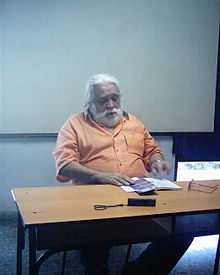Daniel Chavarria

Daniel Chavarria (born 1933) is a Uruguayan revolutionary and writer, living in Cuba.
Life and works
Daniel Chavarria is known to have lived an adventurous life. He worked as a miner in Essen, a model in Cologne, a museum guide at the Prado Museum in Madrid, a dishwasher in Paris and many other countless occupations. He has even disguised himself as a monk.
In 1964 while living in Brazil there was a military coup and he fled to work amongst the gold seekers in the Amazon. Later on, he chartered a small plane to Cuba. There he began working as a Latin and Greek translator and teacher. Subsequently he began his career as a writer. Daniel Chavarria defines himself an Uruguayan citizen and a Cuban writer.
Chavarria’s style of writing is within the Latin-American tradition of political writers, such as Gabriel Garcia Marquez - but with a more optimistic and fresh point of view, similar to Luis Sepulveda and Paco Ignacio Taibo II. He mentions as a child, reading Jules Verne, Emilio Salgari and Alexandre Dumas, and their influence can be clearly seen in his writing. For example, in Tango for a Torturer, the influence of The Count of Monte Cristo is clear.
Chavarria’s books are strongly critical of the violence in Fascism. Chavarria’s life and writings clearly show his communist and revolutionary background. He is a well known supporter of the Cuban Revolution.
In 2010, Chavarria won the National Prize for Literature, Cuba's national prize for literature and more important award of its type in Cuba.[1][2]
Bibliography
- 1978 Joy
- 1984 The 6th Island
- 1991 Allá Ellos
- 1993 The Eye of Cybele
- 1994 Adiós muchachos
- 1999 That Year in Madrid
- 2001 Tango for a Torturer
- 2001 El rojo en la pluma del loro
- 2004 Viudas de sangre
- 2005 Príapos
- 2006 Una pica en Flandes
Awards
Joy:
- Aniversario de la Revolución, La Habana, 1975.
- Capitán San Luis, 1978.
The 6th island:
- Premio de la Crítica, La Habana.
Allá ellos:
- Dashiell Hammett Award, Gijón, 1992.
The Eye of Cybele:
- Planeta-Joaquín Mortiz, México, 1993.
- Educación y Cultura, Montevideo, 1994.
- Ennio Flaiano, Pescara, 1998.
- Premio de la Crítica, La Habana.
Adiós Muchachos:
- Edgar Allan Poe Award - Best Paperback Original, New York, 2002
Tango for a Torturer:
- Casa de las Américas Prize, La Habana, 2000.
- Premio de la Crítica, La Habana.
Viudas de sangre:
- Premio Alejo Carpentier, La Habana, 2004.
Other
References
- ↑ Staff writer (February 12, 2011). "Daniel Chavarría gets National Literature Prize". Havana Times. Retrieved December 20, 2012.
- ↑ Staff writer (2011). "Uruguay’s Daniel Chavarria Wins Cuban Literature Prize". Latin American Herald Tribune. Retrieved December 20, 2012.
External links
|